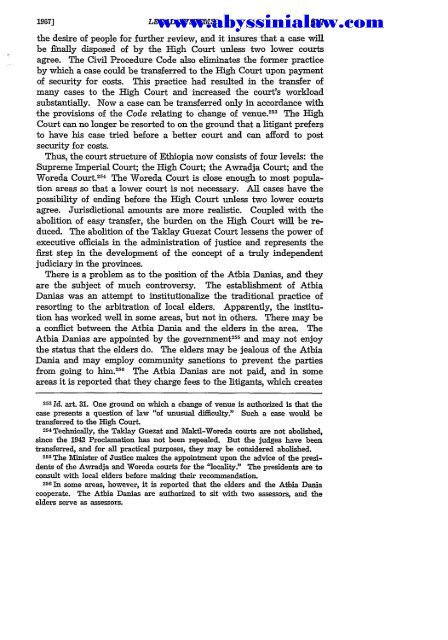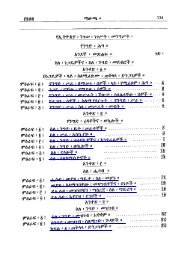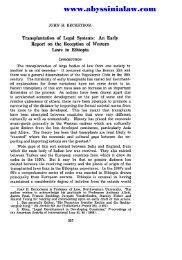You also want an ePaper? Increase the reach of your titles
YUMPU automatically turns print PDFs into web optimized ePapers that Google loves.
LEGAL SYSTEMS<br />
the desire of people for further review, and it insures that a case will<br />
be finally disposed of by the High Court unless two lower courts<br />
agree. The Civil Procedure Code also eliminates the former practice<br />
by which a case could be transferred to the High Court upon payment<br />
of security for costs. This practice had resulted in the transfer of<br />
many cases to the High Court and increased the court's workload<br />
substantially. Now a case can be transferred only in accordance with<br />
the provisions of the Code relating to change of venue. 2 " The High<br />
Court can no longer be resorted to on the ground that a litigant prefers<br />
to have his case tried before a better court and can afford to post<br />
security for costs.<br />
Thus, the court structure of Ethiopia now consists of four levels: the<br />
Supreme Imperial Court; the High Court; the Awradja Court; and the<br />
Woreda Court. 254 The Woreda Court is close enough to most population<br />
areas so that a lower court is not necessary. All cases have the<br />
possibility of ending before the High Court unless two lower courts<br />
agree. Jurisdictional amounts are more realistic. Coupled with the<br />
abolition of easy transfer, the burden on the High Court will be reduced.<br />
The abolition of the Taklay Guezat Court lessens the power of<br />
executive officials in the administration of justice and represents the<br />
first step in the development of the concept of a truly independent<br />
judiciary in the provinces.<br />
There is a problem as to the position of the Atbia Danias, and they<br />
are the subject of much controversy. The establishment of Atbia<br />
Danias was an attempt to institutionalize the traditional practice of<br />
resorting to the arbitration of local elders. Apparently, the institution<br />
has worked well in some areas, but not in others. There may be<br />
a conflict between the Atbia Dania and the elders in the area. The<br />
Atbia Danias are appointed by the government255 and may not enjoy<br />
the status that the elders do. The elders may be jealous of the Atbia<br />
Dania and may employ community sanctions to prevent the parties<br />
from going to him. 256 1967] www.abyssinialaw.com<br />
The Atbia Danias are not paid, and in some<br />
areas it is reported that they charge fees to the litigants, which creates<br />
253 Id. art. 31. One ground on which a change of venue is authorized is that the<br />
case presents a question of law "of unusual difficulty." Such a case would be<br />
transferred to the High Court.<br />
254 Technically, the Taklay Guezat and Maktl-Woreda courts are not abolished,<br />
since the 1942 Proclamation has not been repealed. But the judges have been<br />
transferred, and for all practical purposes, they may be considered abolished.<br />
255 The Minister of Justice makes the appointment upon the advice of the presidents<br />
of the Awradja and Woreda courts for the "locality. ' The presidents are to<br />
consult with local elders before making their recommendation.<br />
256 In some areas, however, it is reported that the elders and the Atbia Dania<br />
cooperate. The Atbia Danias are authorized to sit with two assessors, and the<br />
elders serve as assessors.





